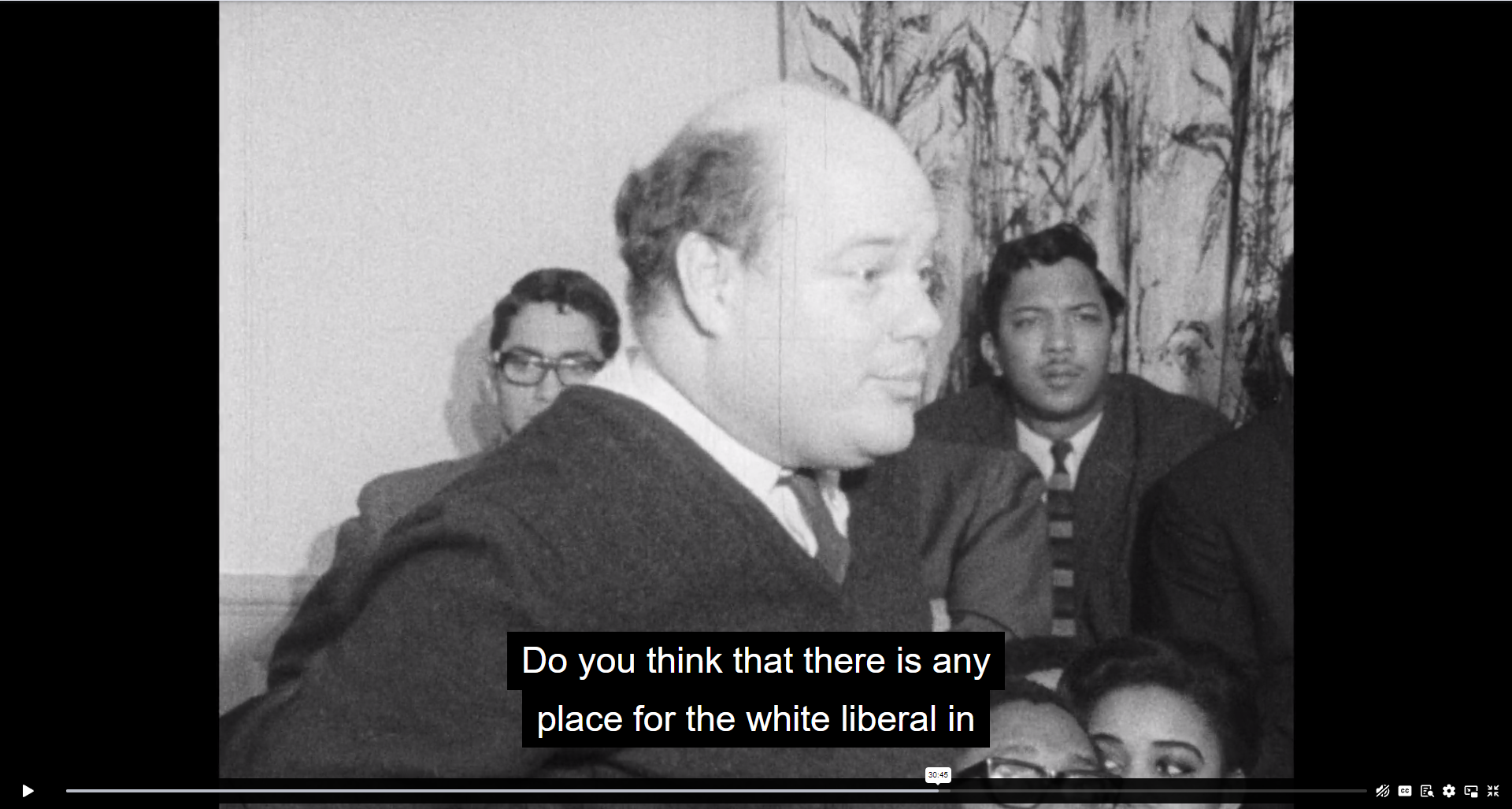JUNE REVIVAL! Baldwin's N***** Film Club Notes
Juneteenth
We began film club with sharing each of our recent Juneteenth celebrations. We each also shared how we were introduced to the holiday, given that it was once so geographically and communally particular. I, as the one of non-American Black heritage, had been curious for some time about how generationally American Black folx relate to Juneteenth now being ostensibly all of our’s as well. We all agreed that Juneteenth is new to each of us, something which we began celebrating in the past decade. We’re finding community around it, and lushness. And with this, we had a very fitting lead in to our discussion on this month’s feature selection, Horace Ové’s 1967 film, Baldwin’s N*****.
a dIASPORIC lINK-UP
One film club member was struck by how James Baldwin relates himself, as a Black American, to others. Particularly how, in this case, he relates himself across diaspora to self-described “West Indians” in Britain. Those who are generationally American in film club related to the opening of his soliloquy with being asked by a Black British West Indian man “Where are you from?”
“Where are you from?”
It still seems like Black Americans are constantly being greeted with this question, “Where are you from?” in diasporic situations. One of our members doesn’t feel like there is a break between Black diasporic people and Black Americans. But Black Americans don’t get enough respect for having our own culture and being culturally grounded.
What we found interesting is that Black Americans frequently don’t get the benefit of having our culture recognized as legitimate. Yet, Black folx from other parts of the Americas, whose ancestors were brought over in slave ships the same way, are given the benefit of having “legitimate culture”. What is this difference? Where do we get this idea?
For another member, this question “Where are you from?” is tied to complexion. They are dark-skinned, and of low country folx. People assume direct African-ness or Caribbean-ness in them.
White Liberals…
“When one say’s ‘white liberal’ you might as well say ‘white missionary’.” And their innocence, “it can menace much much more than the white liberal can imagine.”
The thing is, the way race works in the Caribbean, I wonder if this participant, whom Baldwin assumes is a White Liberal, understands himself as white. Because of the United States’ strict Black / White binary - much too strict even for the Nazis - there is a much bolder line between whiteness and Blackness. Even if this dichotomy was first acted out with the Caribbean and “North America” in colonial relation. There is no question of this man’s whiteness - this is a warning to be absolutely careful of who you give the benefit of Blackness. We conflate the Caribbean now with an endemic, new Native Blackness. With the legitimacy of a new Native Black culture. But this means we too often forget about the White folx there, who then take up Blackness upon their arrival to “North America” and continue to crowd out the voices of those we always struggle to hear - the dark-skinned, the lower-class, the disabled, the indigenous, the. the. the.
… and Black Ones too
One of our members was also struck by the way Dick Gregory closed the film: with "Black liberals”. None of us had heard this term before, but we knew exactly what he meant. Because while we haven’t heard “Black liberal” we have heard “uncle tom”, “coon”, “sellout”, and, of course “all yo skinfolx ain’t your kinfolx”. They pointed out that “Black liberal” can be dangerously slippery; made to mold and contour depending upon whose lips the phrase passes. Relying on the language we do have, that we agreed, is the much better look. Because we all know who they are and how they come in and usurp the gains that come through refusing respectability.
For one of our members, it does feel like Black Americans work on behalf of all Black folx, because we’re all working for the love of Blackness. Where does our Blackness end and theirs begin? Even Black Liberals. So one of our number is less skeptical about than Dick Gregory on Black liberals.
But, what then even is Black liberalism? One of us questioned, what can we even call our work? As Black folx working for Black people, do we even have a name for this? But for this member, our work doesn’t feel like “liberalism” because we aren’t where we need to be.
Perhaps then, is it womanist, our work? Especially when historian Jennifer Morgan argues that Blackness was and is always already defined in a gendered way. As those born of a Black “mother”.
For the Love of Blackness
We all noticed how some of the participants asked question in a skeptical, even harsh manner. This didn’t surprise us, one of us being Caribbean, and all of us noting how tense cross-diasporic Black spaces are. So, what do generationally American Black folx owe diasporic spaces? And what of those who aren’t? What if there are real things of each of us to answer for?
And also, to what degree is the skepticism, the harshness, about engaging an openly gay Black man? How is queerness present in this space? In this film? Where does it live?
FREEDOM VS. POWER
We began to close film club with discussing “freedom” and “power”. Do we really want freedom or do we want power? The liberals, the feminists, the radicals? Are any of us actually doing it just for liberation? And we noticed - it’s not even power alone which we are after. We’re going after a masculinized warping of violence as power.
Another member queried, How do we even define freedom? Are we even all speaking about the same thing? And another one of us asked, do we even need to define freedom in the same way? And why should we even aspire to freedom at all? How can we be free when we need each other?
EMBODIMENT
We closed with the first question of the film: What might the Black man’s personality be like in 50 years (from 1967)? Very Fanonian no? This was asked by a Black femme, seemingly older than the rest of the crowd. And her questioning hands…my mom does the same. Baldwin’s answer surprised me - effectively, he says we’ll return to our bodies - it’s embodiment. Embodiment is vigorous and has vitality. For Baldwin, white folx are fixated on flesh…and mortifying flesh. Which they can do because us racialized folx are the flesh upon which they fixate, what they need to mortify.
For one of our members, embodiment nurtures presence. Allows you to receive information in a different way. Black cultures are more emotional. There is always some sense of the ancestral. There is an acceptance of what my senses are telling me.
With this, we ended with just how good Dick Gregory looks and wished each other happy and healthy weeks. What a Sunday meal. Cheers, y’all.

![[JUN24] 8. Baldwin & Community Plot.png](https://images.squarespace-cdn.com/content/v1/5c1b0e30ee1759b620bb59fb/1720586179034-1JUZ4DQJK14M1GR3DKD9/%5BJUN24%5D+8.+Baldwin+%26+Community+Plot.png)


































![[JUN24] 3. Baldwin & Community Plot.png](https://images.squarespace-cdn.com/content/v1/5c1b0e30ee1759b620bb59fb/1720586321567-8O7NA0P0DLSEQNQ6VMYV/%5BJUN24%5D+3.+Baldwin+%26+Community+Plot.png)